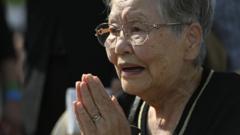At 08:15 on August 6, 1945, the city of Hiroshima faced unimaginable horror as the atomic bomb known as 'Little Boy' exploded, inflicting devastation on its population and the surrounding regions. Lee Jung-soon, now 88 and living in Hapcheon, South Korea, finds it difficult to move past that day. With vivid memories of her father's frantic evacuation call, she recalls the harrowing sight of a city under siege: "They say the streets were filled with the dead – but I was so shocked all I remember is crying."
The explosion, which released the energy equivalent to 15,000 tons of TNT, led to the immediate deaths of approximately 70,000 people, with thousands more succumbing in the months to follow. Despite the extensive documentation of the bombings and their ramifications over the past 80 years, the impact on Koreans—who constituted about 20% of the initial victims—remains largely unnoticed.
Many Koreans were compelled to move to Hiroshima during the 35 years of Japanese colonial rule—a situation often rooted in forced labor and dire living conditions. Tragically, survivors like Lee and Shim Jin-tae, 83, who now reside in Hapcheon—dubbed "Korea's Hiroshima"—continue to grapple with illness and societal neglect. "No-one takes responsibility. America never apologised," Shim laments, highlighting a painful reality for many victims seeking solace and recognition.
Lee is now afflicted with multiple health issues believed to stem from her exposure to radiation, a claim made poignant by the suffering of her son, Ho-chang, who endures kidney failure. Despite the Ministry of Health and Welfare's ongoing genetic studies, significant acknowledgment and support remain elusive for many survivors.
While the direct aftermath of the bomb witnessed horrific labor inequalities—Koreans were often relegated to hazardous jobs, including the grim task of cleaning up post-explosion—societal attitudes did not improve upon their return to Korea. Survivors faced prejudice, shamed as "disfigured" or "cursed," leading to difficulties in securing acceptance and support in their communities.
Second-generation survivors like Han Jeong-sun echo similar sentiments, grappling with inherited medical challenges and stigma. Her son's disability serves as a powerful testament to the lingering effects of that fateful day; yet, the lack of government recognition over disputes of proof concerning their victimhood creates further anguish.
Recent dialogues around reconciliation have been met with skepticism. Hiroshima officials' visit to pay respects to the memorial in Hapcheon encountered criticism for lacking acknowledgment of the plight faced by Koreans during the war. Activists insist that genuine peace must involve sincere acknowledgment and apologies for historical injustices.
As survival stories fade, leaders like Mr. Shim stress the urgent need to capture their experiences for future generations. "Memory matters more than compensation," he states resolutely, asserting the importance of preserving their narratives to confront the shadow of the past and ensure such devastation is never repeated.





















